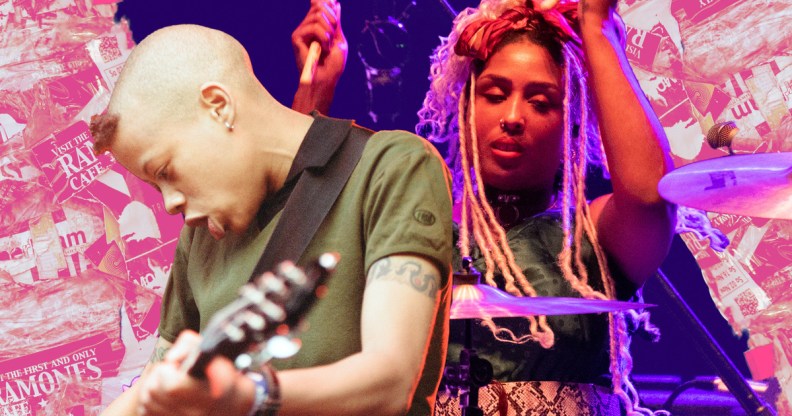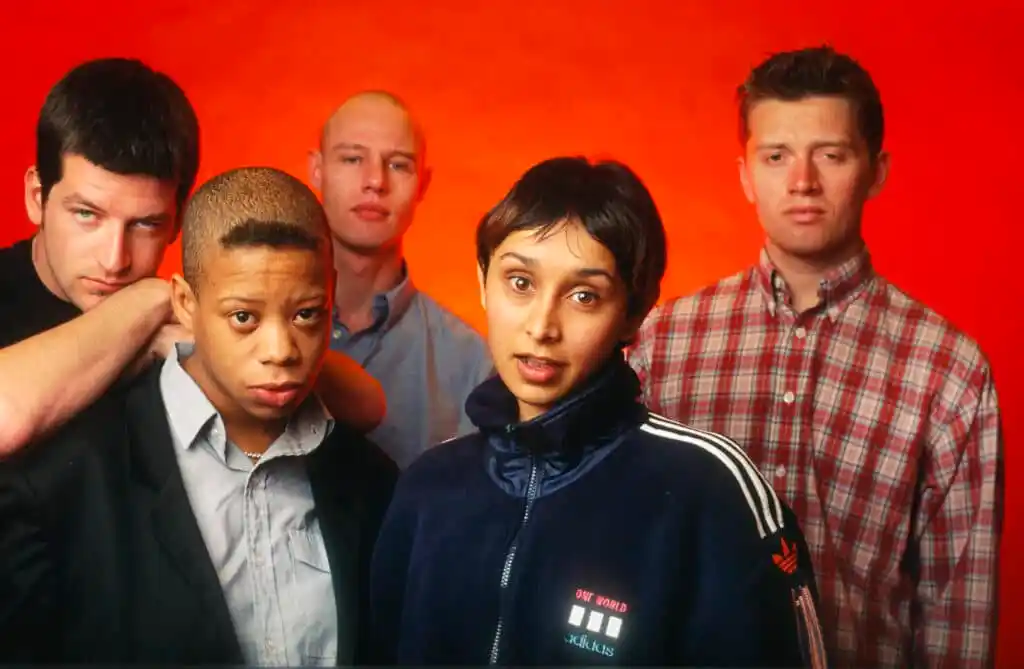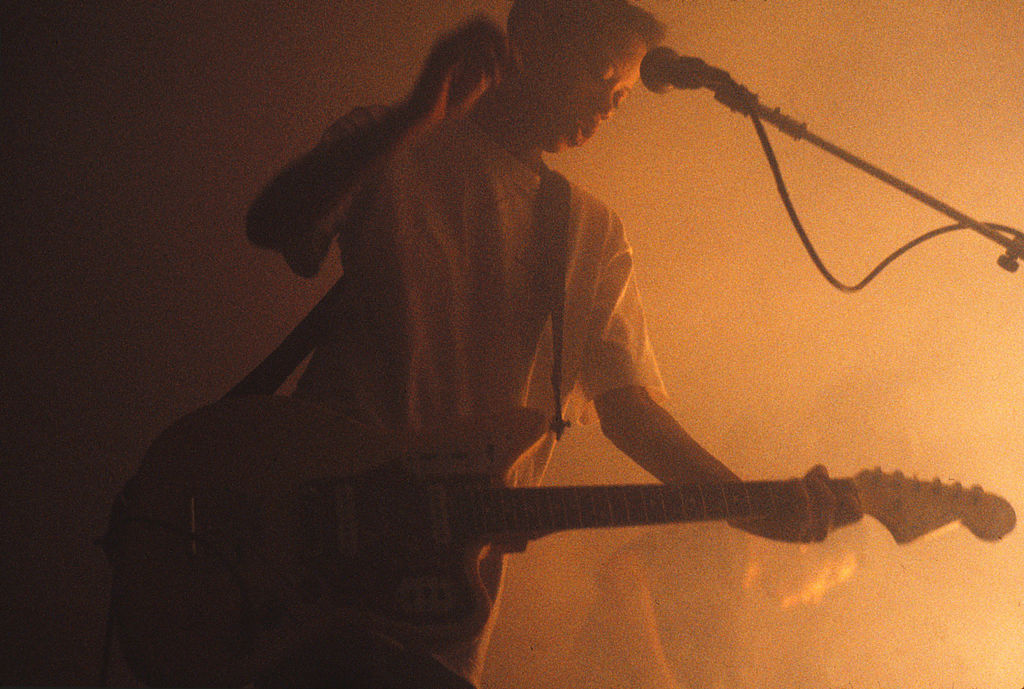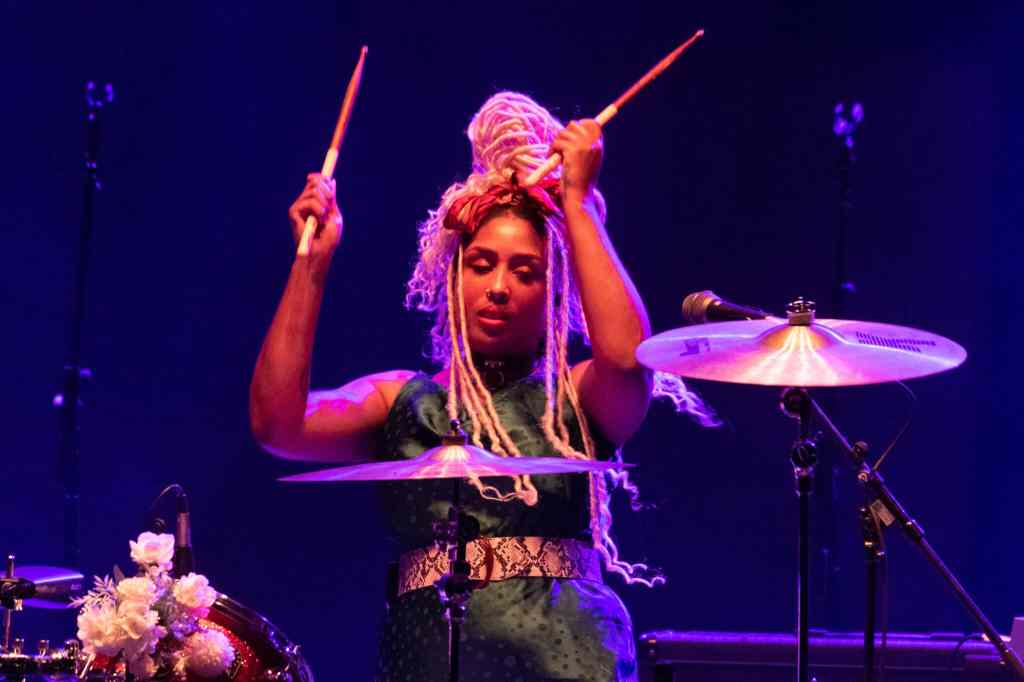The long, rebellious history of queer punks of colour: ‘You don’t give a s**t ‘cos you’re punk’

Debbie Smith (L) and Big Joanie (R). (Getty)
Debbie Smith (L) and Big Joanie (R). (Getty)
Punk grew in the late ’70s as a loud, fast-moving, aggressive form of rock music that was fundamentally alternative, anti-establishment and hugely political – but like any subculture, it’s had its own journey with making LGBTQ+ people of colour feel included.
Legendary queer punk guitarist Debbie Smith stumbled across the genre in the early ’80s, igniting a 40-year career that has seen them play in feminist punk bands, open for David Bowie and form part of the Rebel Dykes movement.
It happened by accident “one particularly horrible morning”, as a 14-year-old Smith was getting “completely p***ed on” while on their paper round.
As they rounded the corner they spotted, amid the torrential rain, a perfectly dry cassette tape in the gutter.
On it were clips from John Peel’s radio show, full of Blondie, Au Pairs and Television – icons of the post-punk movement. From there, Smith discovered Siouxsie and the Banshees, Ramones and The Birthday Party.
“Anything that went ‘ahhhhhh’ really spoke to me,” they tell PinkNews. ‘When you’re a pre-pubescent teenager that’s what is inside of you all the time.”
When Smith arrived as a queer Black person on the predominantly white scene, “there was no community at all”.

“I was pretty much the only person of colour at a gig, there might have been a couple more at goth clubs,” they explain.
“For myself, I didn’t really think of trying to find a Black or queer community within the music scene. It was all about the music. Any Black friends that I had at school listened to Black music – soul, reggae, jazz, funk – which I listened to a bit but wasn’t my main area of interest. I was kind of ‘freaky deaky’ because I liked white people’s music.”
Smith came out as queer aged 17 and “was never ostracised or made to feel wrong” by other punks. “I was just accepted as me,” they say, adding that if people on the street ever gave them hassle: “You don’t give a s**t because you’re a punk.”
One era-defining post-punk band that Smith found solace in were The Slits, working into the early ’80s.
Its lineups included punk legends such as Ari Up and Palmolive, and for Smith played music with “female rhythms”.
“Even though the had male drummers, it’s like their energy was subsumed into a greater female thing. And that I did appreciate a lot.”
Up until the noughties, Smith shuttled from band to band, with notable stints in Echobelly and Curve.

They have played with everyone from David Bowie and Gail Ann Dorsey to Alanis Morisette and Foo Fighters drummer Taylor Hawkins.
Although they never consciously thought about their gender, race or sexuality in relation to their music, it manifested in their creative choices.
“One of my first serious bands in the ’80s was Mouth Almighty and we were all dykes,” they reflect. “We played a lot of gigs, drank a lot of whisky and wrote a lot of songs about breaking up with women.”
Although Mouth Almighty were largely apolitical, when they went on their European tour in the ’90s, this shifted.
“[The tour] was a cooperative thing with lots of queer artists, a lot from the UK, but also from around Europe.
“We were going around Europe, publicising the Section 28 issue. That was a really good thing to be doing politically, which was very unlike us.
“We never really wrote political songs or anything like that. But we thought it was important to go out and do that. And that was great.”
In the ‘90s, as they gained success and a profile, Smith says, “all that anyone ever talked about me was that I was Black and queer”.
“I’ve heard from people who used to go and see Curve and Echobelly that they got the courage to come out and do what they wanted to do from seeing me,” they add.
“I don’t want to be anyone’s role model. But I don’t mind being the person where they can say: ‘Oh my God, that one did it.'”
One band that has followed in Smith’s footsteps is Big Joanie, formed in the ‘10s by a trio of Black feminists who “who combine the fury of ’90s riot grrrl with synth-heavy post punk”.
Drummer Chardine Taylor-Stone discovered punk after moving from London to a majority-white working-class town in the Midlands when they were young.

“Moving from a very multicultural city to a place like that was quite an alienating experience. It’s no wonder that that kind of music spoke to me, being an outsider,” Taylor-Stone tells PinkNews.
At its core punk is all about “flipping the norm” and none more so than Big Joanie, who’ve rocked the punk scene with their politically savvy and acoustically bold sound, and their unapologetic Blackness.
“You can forget the impact that you have on people,” Taylor-Stone reflect. “If I was a young Black woman in the audience, coming to see three black women on stage it would seem amazing to me. And we have a mostly queer Black or people-of-colour crew.”
The group is constantly “unpicking expectations” among audiences, and find themselves in an industry which wants “white young skinny people, be they queer or straight.”
“It doesn’t know what to do with anyone else that doesn’t fit that model,” she says, adding that although punk comes across as subversive, when you go “underneath the surface” it is not “that diverse”.
It’s a sentiment echoed by queer punk poet Jay Mitra.
Mitra found the scene a few years ago after a strict Indian Christian upbringing, and punk gave them solace when they came out as non-binary.
“Screw what anyone else thinks, it doesn’t matter what they think as long as you’re true and honest to yourseIf,” they tell PinkNews.
Despite this, they find themselves often performing to majority white crowds.
“It’s a real shame that you don’t see more people of colour, claiming punk poetry as their kind of poetry,” they say.
“It is so ironic considering the completely anti-establishment, anti-racist components that make up the foundations of punk.”
One organisation trying to create spaces where people of colour can embrace and celebrate punk is Decolonise Fest, an annual non-profit punk festival run by and for punks of colour.
One of the organisers, Stephanie Phillips, explains that when she started on the scene in 2009, there was very little space to discuss experiences of racism.
“It was never spoken about, or why the scene was so white, Phillips tells PinkNews. “Over the years the work of really forthright punks and people of colour in different cities from different alternative themes have pushed it forward.”
Decolonise Fest tries to think about the representation of queer members within their collective and adds: “There’s so many different outlets now that you can have an amazing lineup without a single white act in there.“
One of the acts who’s previously played the festival is Ms Mohammed, the lesbian guitarist for The Sex Patels. Her band was born out of resistance to then-home secretary Priti Patel and the wider Conservative government, and quickly blew up – Ms Mohammed also enjoys a celebrated solo career.
She has South Asian heritage but grew up in Trinidad which is where she first encountered the punk scene. Using Nirvana as her gateway, Ms Mohamed soon discovered riot grrrl, an underground feminist punk movement during the early ‘90s.
“It was just something really new and an energy I could relate to,” she explains. “Probably because I was queer and just feeling like an outsider.”
Although her music is labelled as “political”, for Ms Mohammed it is a lot simpler than that.
“We’re just being our authentic selves. People decide to call it political when you’re just writing about yourself and your own life. When you come from a minority background,” she explains.
“I only ever really get booked for brown gigs, or queer gigs or female gigs. It’s very frustrating. I would love to be on a bill with straight white men because we’re just as good.”

